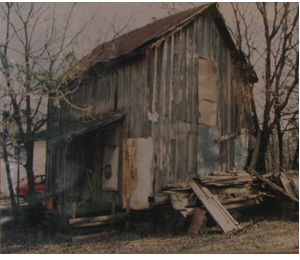The Two Room Shack Where I Grew Up

This is the two-room shack in Waxahachie, Texas where my family lived for the first few years of my life. I wasn't born there — I was born on the kitchen cabinet in my grandmother's house next door. Until I was seven years old, my family lived in that house. We had no running water, no indoor plumbing, no electric lights. We were poor, but no one told my three sisters and me. In fact, I thought we were living the life of Riley, an unworried and fulfilled existence. My mother, from time to time, would feed us a special treat for dinner — a giant biscuit made of cooked flour or oatmeal and sugar syrup — called a hoecake. We didn't know why the kids living in the houses with plumbing didn't get to have that special treat. We felt sorry for them. A few years later we moved to public housing in Wichita Falls. My father worked three jobs so he could buy our first home, where he still lives today.
The American Dream, to many Americans, is a simple one. Many tire and toil just to have an opportunity to raise their family in a place they can call their very own home. My family's story is the American story, and one of uplifting success. Many other American families have not been so fortunate.
This week, my colleagues elected me to lead Democrats on the Subcommittee on Housing and Insurance. Since my election to Congress, I have been privileged to serve on the House Committee on Financial Services. I am grateful for the opportunity to serve in this new role, and eager to lead on an issue that has been important to me my entire life.
Our housing market is recovering but still struggling to gain momentum. We have more work to do to increase opportunities for families around the country; to expand access to housing for both urban and rural communities; to preserve the Fair Housing Act; to end homelessness; to monitor government-sponsored insurance programs, including flood insurance, terrorism risk insurance, and private mortgage insurance; and to ensure low-income and vulnerable communities have the resources they need to succeed, the access to civic, social, and economic opportunities they deserve, and the freedom from digital redlining.
With Republicans in charge of Congress, and a Democratic President in the White House, there is a unique opportunity for us to work together on federal housing policy. I look forward to working with my Democratic and Republican colleagues on these and other important housing and insurance issues.
On Wednesday, our other branch of American government, the Supreme Court, heard arguments for an important housing case. By training, I am a United Methodist preacher. By occupation, I am a member of Congress. But I can tell you — the case challenges a crucial protection of the Fair Housing Act. This protection allows us to recognize and prevent harmful and inequitable policies so that everyone is treated fairly. It's called "disparate impact."
It sounds complicated, and it can be. But in words that even I can understand, it means that banks, landlords, and other housing providers should use policies that apply fairly to everyone. Some policies that sound neutral in theory can have an unfair impact in practice, excluding or segregating some communities. We are fortunate in 2015, in that overt and officious racism is now considered odious and ostracizing. But we are by no means a perfect or a post-racial society. We are simply a society where modern-day discrimination is seldom shouted from the rooftops. It is quiet. It is covert. But it is still dangerous. If the Supreme Court were to get rid of this protection, what could happen?
An apartment building could exclude applicants without full-time jobs. This would keep out people – like disabled veterans or seniors — who do not work full-time but can still afford an apartment. An apartment building could restrict occupancy to one person per bedroom. Families with children would be barred from renting or would be forced to rent more expensive multi-bedroom apartments. A bank could charge an exorbitant deposit fee for those who seek home mortgage loans. Older Americans, veterans, or people of color with limited means would be forced to take on more risky and costly loans or not have access to financing at all.
Keep in mind, the Fair Housing Act and its protections have enjoyed bipartisan support for over four decades. Disparate impact has, too. It did not come from President Obama or even President Clinton — it was adopted by President Nixon's Administration as an enforcement tool. The Supreme Court's upcoming ruling on the Fair Housing Act will test our nation's commitment to equal treatment under the law. It will determine whether equal opportunity in housing continues to be one of our most cherished values.
I wrote an op-ed on why I believe this is important. You can read the full op-ed here → All Americans Deserve Access to Fair Housing. And you can read more about what kinds of topics we work on in the House Financial Services Committee by clicking here.